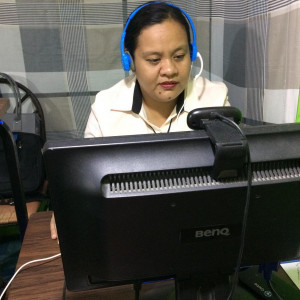What do you not like about remote work?
Interview with Igor Kulman, a software engineer building iOS apps remotely
Working remotely can sometimes get lonely. You can feel isolated, missing human contact. Communication can be also a bit tricky sometimes. It helps to work for a company that is remote, meaning most of the people are working remotely so the tools and workflows reflect that.
Igor converted a part-time contract into a full-time remote software engineering job—learn how he did it and his tips for working remotely.
Read full interview from Interview with Igor Kulman, a software engineer building iOS apps remotely.
Interview with Hannah, a freelance writer that travels the world
For me, the hardest part of working from my computer is that it involves a lot of sitting. Too much sitting is terrible for your health. I’ve even heard people say that in some ways it’s as bad for your health as smoking.
Since right now I’m a complete digital nomad without a home base, it doesn’t make sense to invest in a standing desk. Some coworking spaces have standing options, but that’s not always the case, and I don’t always have a coworking space.
This means I need to get creative to keep healthy blood circulation flowing. There are a lot of tasks I need to sit for, but you can bet that if I don’t need to sit for a task, I’ll try to avoid it. If I’m on the phone, I’ll try to walk around. If I need to watch a video, I’m watching it while I’m doing squats or stretching.
Another tough aspect of remote work is that it can be isolating not working near other people. If there is a social coworking space nearby, I highly recommend signing up for it.
Coffee shops are a bit too noisy for me, but it’s another option. If a significant other or friend can also work remotely, try working in the same room. It may seem silly to have somebody nearby if you aren’t communicating frequently, but it’s still nice to have someone there for occasional chatting.

Hannah is a freelancer writer and social media manager that travels the world while working remotely. Read her interview to learn how she works.
Read full interview from Interview with Hannah, a freelance writer that travels the world.
Interview with Bennah, a remote ESL teacher that teaches kids English all over the world
What I do not like about remote work is that sometimes, I have difficulty understanding what the clients want since language barrier is really a deal.
And the job is not permanent so you do not know if it would really compensate you well since there are no fix salary rates for the job.
Bennah is an ESL (English as a Second Language) Teacher who teaches students from all around the world while working from home.
Read full interview from Interview with Bennah, a remote ESL teacher that teaches kids English all over the world.
Interview with Deb, a sales copywriter who transitioned from software development
There are a few downsides about remote work, in my view these are:
- The feast or famine cycle – At times I’ve had more work than I can handle, at other times I’ve had to go weeks before I got a proper project. This can be a challenge at times.
- The absence of face to face interaction with colleagues – One of the biggest drawbacks of remote work is working on my own. Feeling isolated is a reality especially when I am doing a long-term project which means I am tied to my laptop for weeks on end.
- Building fresh client relationships from scratch – Its not just getting a project, executing it and moving on to the next one. Its all about building new client relationships each time you bid for a project so that you can sell your skills to them. If your wavelength and your client’s wavelength doesn’t match, then you could face a problem.
- Clients ending projects abruptly – A couple of times I’ve faced the situation of clients ending projects abruptly. One time, there was this client who’d signed me up for a 6 month plus project asking for a firm commitment from me for 38 hours per week. As a result, I declined a lot of other projects, after starting that one. Imagine my situation after a month when the client told me that he had to end the project even though my work had been exemplary. The reason he gave me was that he was facing a sudden cash crunch because of some another project that he had to work on. Not a very happy situation for me to be in!
- Clients not paying on time or not paying at all – I have been reasonably lucky to have been paid by clients most of the time. However, there have been a couple of instances (outside of Upwork), when the client disappeared without paying me after I did my work and gave it to them. Another instance, I had to follow up with the client for 2 months before I got the payment.
- No company sponsored benefits – As a freelancer, I have to grapple with not having access to any benefits that are usually provided by companies. So, I don’t have any company sponsored medical insurance, pension plan, paid leave, sick leave.
- Juggling multiple clients – I don’t have one boss to answer to which can be an issue sometimes. At times I have more than one client (max I’ve dealt with at the same time is 7 clients). Each client’s work is equally important, and I have to deal with managing their expectations, responding to all of them promptly, and ensuring that they are satisfied with my deliverables. Doing this can be a mental strain.
- Having to take care of all the business aspects myself – Since I am a one-man shop, I have to take care of all the business aspects myself. From marketing, sales, invoicing (when not working on Upwork), troubleshooting technology, keeping track of tax deductible expenses etc.
- No one to back me up if I am injured or sick – A very big problem when working as a remote worker. As an employee of a company, I used to have colleagues who would take up the slack if I was unwell. But, as a remote worker this can be a major issue. I’ve lost one large project because I was out of action for 2 weeks due to sickness.
Deb made the jump from full-time software developer to freelance sales copywriter—learn how he made the transition.
Read full interview from Interview with Deb, a sales copywriter who transitioned from software development.
Interview with Hanling, a data scientist that works remotely on machine learning
If we have a long-term remote job to dedicate in, that's absolutely ideal. But the more cases freelancers experience are that they have to keep on looking for new jobs.
We have to waste a lot of time viewing and applying for jobs. And we may spend a lot of time analyzing the problem clients proposed, chatting with clients to know details and making bids but to find they have a surprising low budget or short time frame, or they are just consulting multiple people without the aim to pay.
These make me feel distressed.
So what remote work frustrates me most is not having steady work to do and wasting time looking for new jobs.
Hanling started working remotely as a student and now does freelance machine learning and data analysis for clients all around the world.
Read full interview from Interview with Hanling, a data scientist that works remotely on machine learning.
Interview with Henry, a consultant who found remote work by saying No
It's harder to divide work from home. If, in the middle of a workday, there is something better to do in my life... I can take a break. If I want to work at night, my computer and everything I need to work is just a few steps away.
When I'm not focused on it, the easy access to work can sometimes negatively impact my life, and the easy access to my life negatively impact my work.
I try hard to block off times to start and end work.
Sometimes a "no" can lead to an exceptional opportunity. For Henry, that answer led to an ideal remote work career. In this interview, Henry shares his remote work tool stack, and essential tip for remote employees and managers.
Read full interview from Interview with Henry, a consultant who found remote work by saying No.
Interview with Stefan, a founder building a location-independent startup
There is no one to bounce ideas off of when you’re working alone. This can be mitigated by joining a coworking space or working in pods (a few remote workers working together, whether on the same thing if they’re all employees of the same company or everyone working on their own thing).
Stefan now has total control over his time since leaving the traditional office in early 2019. Hear how his routine is helping him build a solid remote startup.
Read full interview from Interview with Stefan, a founder building a location-independent startup .
Interview with Erin, a virtual assistant with a successful approach to freelancing
It's hard to build a friendly rapport with people that you've never met in person!
Clients don't get know the little quirks that make you unique when you're fully remote.
While I do hop on Zoom chats with clients when I can, speaking to someone over video isn't quite the same as grabbing a coffee in person or bumping into one another in the office. You must work harder to remind clients that there's a human behind the screen!
Erin has found freelancing success as a virtual assistant—see her organizational tips & insights into how she picks clients that suit her business.
Read full interview from Interview with Erin, a virtual assistant with a successful approach to freelancing.
Interview with John, a web developer who works from home
I love pretty much everything about working remotely, but there definitely are a few challenges.
When you work with a team 8 hours a day for months or even years, they become your friends as well as co-workers. Not having the option to end the day with an impromptu group going out for a meal is a bummer. For me, having a meal with my team would require a lot of planning and travel.
When I was running a business, I was really terrible at setting boundaries. It became very easy to be at my desk every waking moment. This lead to some terrible burnout.
I'm much better about it now, but I have to stay on top of it so that I don't fall back into old habits.
John is a web developer running a mini-agency inside a larger WordPress agency - learn how calendar management and establishing boundaries have helped him boost his productivity.
Read full interview from Interview with John, a web developer who works from home.
Interview with Haley, a VP of Operations shares her stellar remote work strategies
I occasionally miss office snacks, although it’s probably net positive for my health.
We get together as a leadership team a few times a year, and that in-person time to connect and brainstorm is always energizing. I’m hopeful that we can do more of that with the team in years to come.
Haley has figured out the way she works best as a VP of Operations. See her principles of remote work and the unique advice a former boss gave her about breaks.
Read full interview from Interview with Haley, a VP of Operations shares her stellar remote work strategies.









